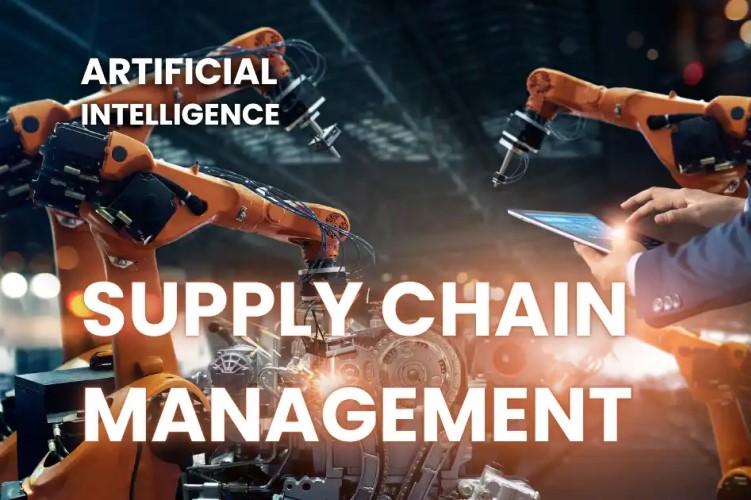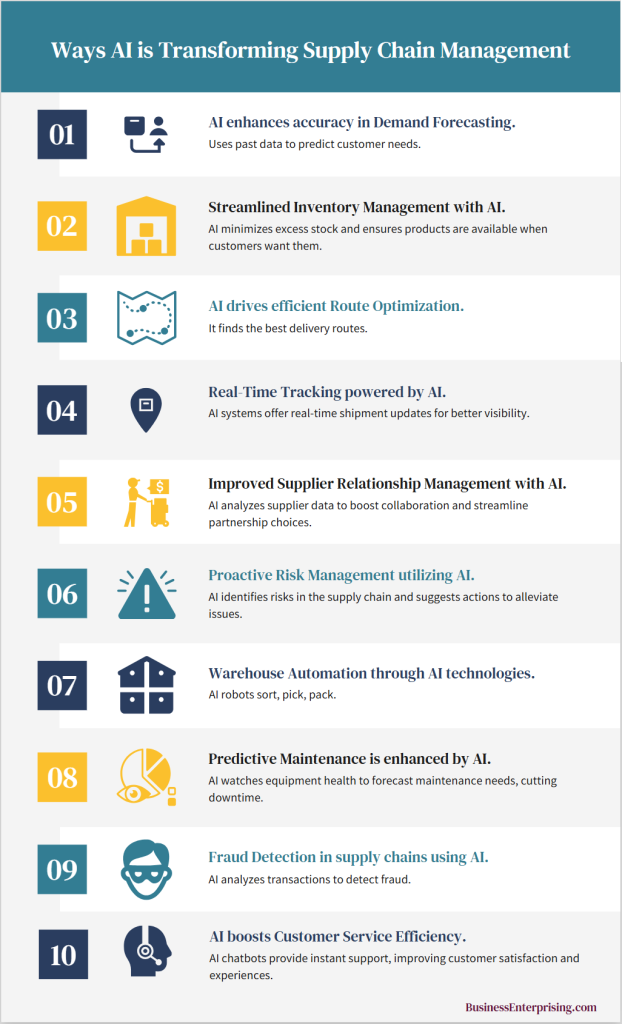 AI and supply chain management are transforming how businesses operate, offering smarter solutions for efficiency and growth. By automating processes and analyzing data, AI helps you optimize logistics, forecasting, and inventory management. Additionally, it enables quicker responses to market changes and disruptions.
AI and supply chain management are transforming how businesses operate, offering smarter solutions for efficiency and growth. By automating processes and analyzing data, AI helps you optimize logistics, forecasting, and inventory management. Additionally, it enables quicker responses to market changes and disruptions.
However, implementing AI comes with challenges, including data privacy concerns and ethical considerations. Addressing these issues ensures your use of AI aligns with industry standards and builds trust. Furthermore, integrating AI effectively requires a balance between automation and human oversight to maintain fairness and accountability.
As supply chains become more complex, AI provides the tools to adapt and thrive. With careful planning and strategic use, AI enhances decision-making and strengthens your supply chain network. Embracing this technology positions your business for long-term success in a competitive market.
The Role of AI in Modern Supply Chains
AI is revolutionizing modern supply chains by automating processes, enhancing predictions, and improving decision-making. Automation streamlines repetitive tasks, such as order processing and warehouse management, reducing errors and saving time. Additionally, AI-powered systems can process large amounts of data faster than traditional methods, increasing efficiency across the supply chain.
Predictive analytics is another transformative aspect of AI and supply chain management. By analyzing historical and real-time data, AI can forecast demand more accurately. This allows you to adjust production and inventory levels proactively. Furthermore, predictive tools help identify potential disruptions, enabling you to minimize risks and maintain smooth operations.
AI also enhances decision-making by providing actionable insights. Machine learning algorithms analyze complex patterns and recommend optimal strategies for logistics, procurement, and resource allocation. Additionally, AI can simulate different scenarios, helping you evaluate the impact of decisions before implementing them. This capability supports better planning and adaptability.
Integrating AI into supply chain management enables businesses to improve efficiency and stay competitive. By leveraging automation, analytics, and smarter decision-making, you can respond more effectively to market demands and challenges. These advancements create opportunities for growth and innovation in a rapidly changing industry.
Improving Demand Forecasting with AI
AI is transforming demand forecasting by providing more accurate and dynamic insights. Traditional methods often rely solely on historical sales data, which can limit their accuracy. However, AI analyzes historical data alongside market trends and real-time variables, creating a more comprehensive view of future demand.
By incorporating multiple data sources, AI can identify patterns that may not be immediately apparent. For instance, it can detect seasonal trends or shifts in consumer behavior more effectively. Additionally, AI tools continuously update forecasts as new data becomes available. This allows you to adapt quickly to changing market conditions.
AI and supply chain management work together to reduce overstocking or stockouts through precise demand planning. Accurate forecasts help you optimize inventory levels and align production with actual market needs. Furthermore, improved forecasting reduces costs by minimizing waste and avoiding unnecessary expenses related to excess inventory.
By leveraging AI for demand forecasting, you can make smarter, data-driven decisions that benefit your entire supply chain. These tools not only improve efficiency but also enhance your ability to meet customer expectations consistently. AI provides a powerful way to stay competitive in a rapidly evolving market.
AI-Powered Inventory Management
AI-powered inventory management is revolutionizing how businesses handle stock across the supply chain. By analyzing real-time data and historical trends, AI helps optimize inventory levels to meet demand more accurately. However, it also considers variables like seasonality and market fluctuations, reducing the guesswork involved in traditional methods.
Additionally, AI minimizes waste by predicting demand and aligning inventory with actual needs. Overstocking and understocking are costly issues that disrupt cash flow and customer satisfaction. With AI and supply chain management working together, you can strike the right balance and maintain efficient operations. These tools also provide alerts for slow-moving items, helping you make timely decisions to clear excess stock.
AI enhances stock availability by monitoring supply and demand in real time. It can detect potential shortages and recommend proactive solutions, such as reallocating inventory or increasing orders from suppliers. Furthermore, integrating AI with automated systems allows you to respond quickly to changes in demand, improving customer service and reducing delays.
By leveraging AI for inventory management, you improve efficiency and reduce costs while enhancing reliability across your supply chain. These advancements not only streamline operations but also create a more responsive and competitive business model. AI is a game-changer in meeting today’s inventory challenges.
Enhancing Logistics and Transportation with AI
AI is transforming logistics and transportation by optimizing routes, improving tracking, and reducing costs. By analyzing traffic patterns and delivery schedules, AI identifies the most efficient routes. This reduces fuel consumption and shortens delivery times, enhancing overall efficiency. Additionally, AI adapts to real-time changes, such as road closures, keeping operations smooth.
Real-time tracking is another powerful application of AI and supply chain management. With advanced sensors and analytics, AI provides accurate updates on shipment locations. This improves transparency and allows you to address potential delays proactively. Furthermore, customers benefit from better visibility, increasing their satisfaction with your service.
AI also helps lower logistics costs by automating decision-making processes. It identifies cost-saving opportunities, such as load optimization and better fleet management. Additionally, predictive analytics assist in anticipating demand, enabling you to plan transportation resources more effectively. These efficiencies not only save money but also support sustainability efforts.
Integrating AI into logistics and transportation enhances both speed and reliability across the supply chain. By leveraging these technologies, you gain a competitive advantage while improving customer experience. AI’s ability to adapt and innovate makes it a valuable tool for modern logistics challenges.
AI for Risk Management and Resilience
AI plays a critical role in managing risks and building resilience in supply chain networks. By analyzing large volumes of data, AI identifies potential vulnerabilities before they become significant issues. However, relying solely on historical data may not be enough. AI also incorporates real-time insights to predict disruptions more accurately.
Predictive analytics helps you anticipate challenges such as supply shortages, transportation delays, or shifts in demand. With this information, you can develop proactive strategies to minimize their impact. Additionally, AI enables scenario planning, allowing you to evaluate various responses and select the best course of action.
AI and supply chain management work together to create more resilient networks. Advanced algorithms monitor factors like weather, geopolitical events, and market fluctuations, providing early warnings about potential risks. Furthermore, AI helps prioritize solutions, ensuring your resources are allocated effectively during disruptions.
By integrating AI into risk management, you strengthen your supply chain’s ability to adapt and recover. This not only reduces downtime but also builds trust with customers and partners. Leveraging AI for resilience enhances your competitive edge and prepares your business for future challenges.
Challenges and Ethical Considerations of AI in Supply Chain
Implementing AI in supply chain management comes with challenges that require careful consideration. One significant hurdle is integrating AI with existing systems. Legacy infrastructure may not support advanced technologies, leading to compatibility issues. However, investing in upgrades and training can address these barriers over time.
Data privacy is another concern when adopting AI solutions. AI relies on vast amounts of data to function effectively, which raises questions about how this data is stored and used. Additionally, mishandling sensitive information can result in security breaches or legal consequences. Establishing robust data governance policies helps protect both your business and your customers.
Ethical implications also arise when relying on AI for supply chain decisions. Algorithms may unintentionally favor certain outcomes, leading to biases in resource allocation or pricing. Furthermore, over-reliance on AI could diminish human oversight, increasing the risk of unintended consequences. Balancing automation with human judgment ensures ethical practices remain at the forefront.
Navigating these challenges requires a thoughtful approach and ongoing evaluation. By addressing implementation, privacy, and ethical concerns, you build a more trustworthy and effective system. Incorporating AI into supply chain management responsibly enhances its benefits while minimizing risks.
Conclusion
AI and supply chain management offer powerful solutions to enhance efficiency, predictability, and resilience. By leveraging AI, you can optimize processes, improve forecasting, and adapt quickly to disruptions. However, integrating AI successfully requires addressing challenges like data privacy, ethical concerns, and system compatibility.
Additionally, a thoughtful approach to implementation ensures that AI enhances decision-making without compromising transparency or fairness. Balancing automation with human oversight strengthens trust and reduces potential risks. Furthermore, continuously evaluating your AI systems allows you to adapt to evolving needs and industry standards.
As AI continues to shape supply chains, it provides opportunities for growth and innovation. Embracing these technologies responsibly positions your business for long-term success while maintaining ethical practices. By combining advanced tools with sound strategy, you can build a more efficient and competitive supply chain.



